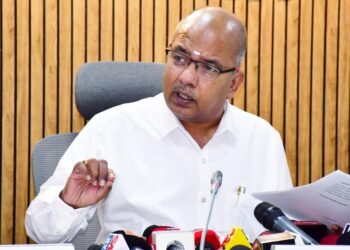The Election Commission of India (ECI) has published the data from the 2022 Special Intensive Revision (SIR) of the electoral rolls in West Bengal, amid political tension over a similar ongoing exercise in Bihar and firm opposition from West Bengal Chief Minister Mamata Banerjee.
The release of the data—covering 11 of Bengal’s 23 districts and 103 of the 294 assembly constituencies—comes just days after the 2003 Bihar SIR data was made public as a reference point for a fresh revision process initiated on June 28. The revised electoral exercise requires voters to verify their details and submit enumeration forms, although nearly 60% of the electorate need not submit any new documents.
Published under the label “Electoral Roll of SIR, 2002” on the Bengal CEO’s website, the data includes districts like Cooch Behar, Jalpaiguri, Darjeeling, Nadia, Hooghly, and Midnapore. The remaining constituencies will be added in upcoming updates.
The move has sparked political backlash, especially in Bihar, where opposition parties have criticized the timing and alleged that backward communities could be unfairly disenfranchised due to document requirements. West Bengal’s ruling Trinamool Congress (TMC) has also alleged that the exercise is a covert attempt to implement the National Register of Citizens (NRC).
On July 21, Mamata Banerjee stated she would not allow the SIR to be carried out in West Bengal. Addressing officials in Birbhum, she warned Booth Level Officers (BLOs) against removing names from the voter list without due process. “Until the poll dates are announced, the administration is under the state government. Do not harass people unnecessarily,” she said.
Opposition BJP leader Suvendu Adhikari, meanwhile, raised concerns over a sudden rise in new voter applications in border districts. He claimed this coincided with state instructions to issue domicile certificates and has urged the ECI to disqualify certificates issued after July 25, 2025.
TMC MP Mahua Moitra has challenged the Bihar SIR in the Supreme Court, citing fears of mass voter exclusion. Her petition argues that the ongoing and proposed revisions mirror the NRC process, with inadequate safeguards and a narrow list of accepted documents. She contended that Aadhaar, voter ID, and ration cards are not included among the 11 documents required for citizenship proof.
Moitra and other petitioners stressed that a summary revision had already been conducted in Bihar from October 2024 to January 2025, making a second round unnecessary and discriminatory—especially against Muslim, Dalit, and migrant communities.
The ECI, on its part, has justified the new revision as essential to cleaning the electoral rolls in light of increased migration, urbanisation, deaths, and the inclusion of undocumented foreigners.





























